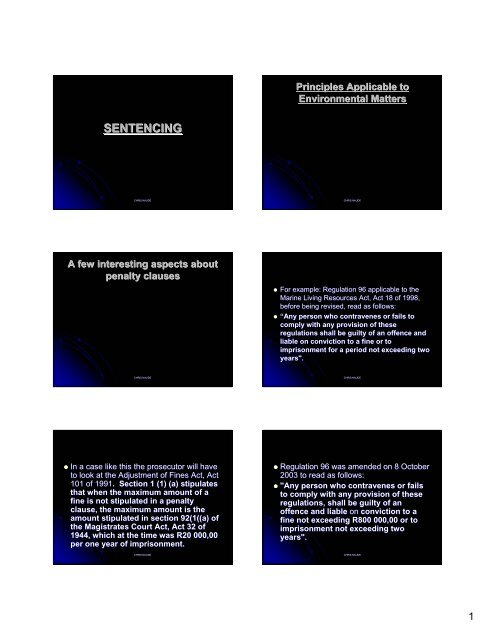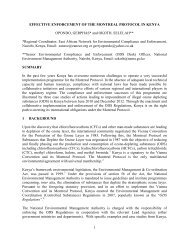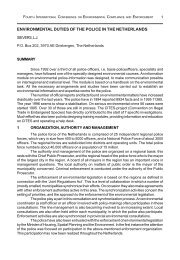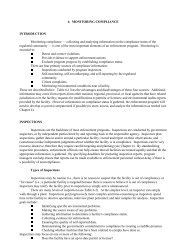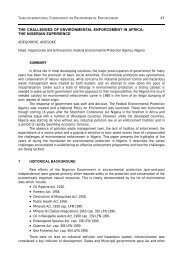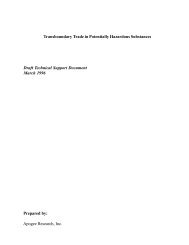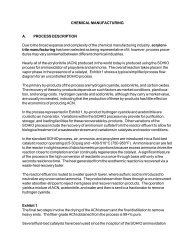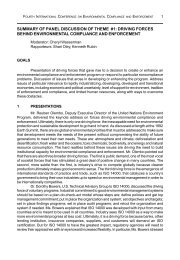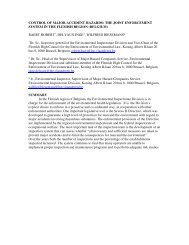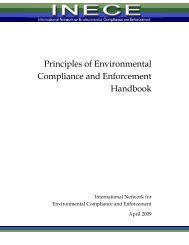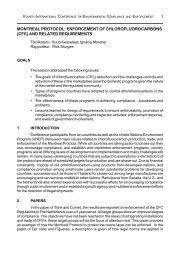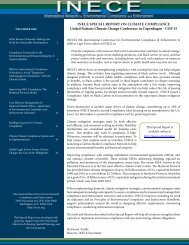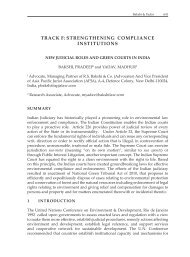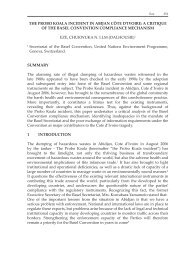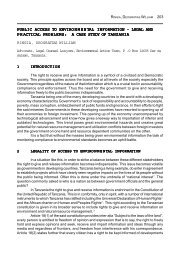SENTENCING - Inece
SENTENCING - Inece
SENTENCING - Inece
You also want an ePaper? Increase the reach of your titles
YUMPU automatically turns print PDFs into web optimized ePapers that Google loves.
Principles Applicable to<br />
Environmental Matters<br />
<strong>SENTENCING</strong><br />
CHRIS NAUDE<br />
CHRIS NAUDE<br />
A few interesting aspects about<br />
penalty clauses<br />
• For example: Regulation 96 applicable to the<br />
Marine Living Resources Act, Act 18 of 1998,<br />
before being revised, read as follows:<br />
• “Any person who contravenes or fails to<br />
comply with any provision of these<br />
regulations shall be guilty of an offence and<br />
liable on conviction to a fine or to<br />
imprisonment for a period not exceeding two<br />
years".<br />
CHRIS NAUDE<br />
CHRIS NAUDE<br />
• In a case like this the prosecutor will have<br />
to look at the Adjustment of Fines Act, Act<br />
101 of 1991. . Section 1 (1) (a) stipulates<br />
that when the maximum amount of a<br />
fine is not stipulated in a penalty<br />
clause, the maximum amount is the<br />
amount stipulated in section 92(1((a) of<br />
the Magistrates Court Act, Act 32 of<br />
1944, which at the time was R20 000,00<br />
per one year of imprisonment.<br />
CHRIS NAUDE<br />
• Regulation 96 was amended on 8 October<br />
2003 to read as follows:<br />
• "Any person who contravenes or fails<br />
to comply with any provision of these<br />
regulations, shall be guilty of an<br />
offence and liable on conviction to a<br />
fine not exceeding R800 000,00 or to<br />
imprisonment not exceeding two<br />
years".<br />
CHRIS NAUDE<br />
1
• Can the court impose a sentence of<br />
correctional supervision in terms of<br />
section 276(1)(h) of the Criminal<br />
Procedure Act, Act 51 of 1977 for a<br />
statutory offence, if the statute creating<br />
the offence did not provide for such a<br />
sentence but only for a fine or<br />
imprisonment<br />
• The factors to consider when imposing an<br />
appropriate sentence have been set out and<br />
confirmed in a number of cases. One of the<br />
best known is S v Zinn 1969 (2) SA 537 A, in<br />
which they were confirmed to be the<br />
following:<br />
1) The personal circumstances of the accused;<br />
2) The seriousness of the offence;<br />
3) The interests of society.<br />
CHRIS NAUDE<br />
CHRIS NAUDE<br />
• Apart from these factors, one also<br />
needs to consider the aims of<br />
sentencing before an appropriate<br />
sentence can be imposed. The<br />
sentence must have the following aims:<br />
1) Serve as a deterrent;<br />
2) Be preventative;<br />
3) Be retributive;<br />
4) Be reformative.<br />
1 The personal circumstances<br />
of the accused<br />
CHRIS NAUDE<br />
CHRIS NAUDE<br />
Forfeiture<br />
The property or items subject to<br />
an order of forfeiture<br />
CHRIS NAUDE<br />
CHRIS NAUDE<br />
2
• The forfeiture of exhibits that were<br />
handed in at court during the trial<br />
whether a conviction was obtained or<br />
not (Section 34 of Act 51/77) and;<br />
• The forfeiture of an article to the State<br />
after a conviction was obtained.<br />
(Section 35 of Act 51/77)<br />
CHRIS NAUDE<br />
CHRIS NAUDE<br />
• "Any weapon, instrument or other<br />
article by means whereof the<br />
offence in question was committed or<br />
which was used in the commissioning<br />
of such an offence.”<br />
• Firstly the aims of forfeiture. They are:<br />
i. Removing the incentives to commit crime;<br />
ii. Deterring persons from using property to<br />
commit crime;<br />
iii.Neutralising property previously used to<br />
commit crime;<br />
iv.Advancing the ends of justice by depriving<br />
those involved in crime of the use of that<br />
property.<br />
CHRIS NAUDE<br />
CHRIS NAUDE<br />
• In achieving these objectives, the focus<br />
is:<br />
- not on the guilty state of mind of the<br />
wrongdoer but on the role played by<br />
the property in the commission of the<br />
crime;<br />
- the question is whether a functional<br />
relationship has been established<br />
between the property and the crime.<br />
• There is however another example<br />
of asset forfeiture in terms of The<br />
Prevention of Organised Crime Act,<br />
Act 121 of 1998.<br />
CHRIS NAUDE<br />
CHRIS NAUDE<br />
3
What are the aims of asset<br />
forfeiture in terms of this Act<br />
Who does it<br />
CHRIS NAUDE<br />
CHRIS NAUDE<br />
How does it work<br />
Criminal forfeiture<br />
CHRIS NAUDE<br />
CHRIS NAUDE<br />
Civil forfeiture<br />
Further examples of the active<br />
role played by prosecutors<br />
during sentencing:<br />
CHRIS NAUDE<br />
CHRIS NAUDE<br />
4
• "Any person convicted of an offence under this<br />
ordinance shall, subject to the provisions of<br />
subsection 2, be liable in the case of –<br />
• (a) a contravention of section 29 or 44(1) involving<br />
an endangered wild animal, section 63(1) involving<br />
endangered flora to a fine not exceeding R100 000,00<br />
or to imprisonment for a period not exceeding ten<br />
years or to both such fine and such imprisonment,<br />
and to a fine not exceeding three times the<br />
commercial value of any endangered wild animal or<br />
carcass thereof or any endangered flora in respect<br />
of which the offence was committed".<br />
2. The seriousness of the<br />
offence<br />
CHRIS NAUDE<br />
CHRIS NAUDE<br />
Statistics<br />
• There are, however, numerous<br />
difficulties with regard to these<br />
statistics:<br />
CHRIS NAUDE<br />
CHRIS NAUDE<br />
The benefits of correctly kept<br />
and presented statistics are the<br />
following:<br />
Evidence about potential<br />
damage to the environment<br />
CHRIS NAUDE<br />
CHRIS NAUDE<br />
5
• 34(1): "Whenever any person is convicted of an<br />
offence under any provision listed in<br />
\schedule 3 and it appears that such<br />
person has by that offence caused loss or<br />
damage to any organ of state or other<br />
person, including the cost incurred or likely to be<br />
incurred by an organ of state in rehabilitating the<br />
environment or preventing damage to the environment,<br />
the court may in the same proceedings at the written<br />
request of the Minister or other organ of state or other<br />
person concerned, and in the presence of convicted<br />
person, inquire summarily and without pleadings into<br />
the amount of the loss or the damage caused.<br />
• 34(2): Upon proof of such amount, the court may give<br />
judgement therefore in favour of the organ<br />
of state or other person concerned against the<br />
convicted person, and such judgement shall be of the<br />
same force and effect and be executable in the same<br />
manner as if it had been given in a civil action duly<br />
instituted before a competent court".<br />
• 34(3): "Whenever any person is convicted<br />
of an offence under any provision<br />
listed in Schedule 3, the court<br />
convicting such person may<br />
summarily enquire into and assess<br />
the monetary value of any<br />
advantage gained or likely to be<br />
gained by such person in<br />
consequence of that offence and, in<br />
addition to any other punishment<br />
imposed in respect of that offence,<br />
the court may order the award of<br />
damages or compensation or a fine<br />
equal to the amount so assessed".<br />
CHRIS NAUDE<br />
CHRIS NAUDE<br />
• 34(4): "Whenever any person is<br />
convicted of an offence under<br />
any provision listed in Schedule 3,<br />
the court convicting such person<br />
may, upon application by the public<br />
prosecutor or another organ of<br />
state, order such person to pay<br />
reasonable costs incurred by the<br />
public prosecutor or another organ<br />
of state, order such person to pay<br />
reasonable costs incurred by the<br />
public prosecutor and the organ of<br />
state concerned in the investigation<br />
and prosecution of the offence".<br />
CHRIS NAUDE<br />
3. The interests of society<br />
CHRIS NAUDE<br />
Aims of sentencing<br />
How to present a section 105<br />
A plea and sentence agreement<br />
in court<br />
CHRIS NAUDE<br />
CHRIS NAUDE<br />
6
• The court must then ask questions to satisfy itself that the<br />
agreement was reached after:<br />
i. consultation with the person in charge of the investigation (sec<br />
105 (4) (ii) );<br />
ii<br />
the complainant was afforded the opportunity to make<br />
representations should the complainant be dissatisfied with<br />
the contents of the agreement or any condition relating to<br />
compensation or the rendering of a specific benefit to the<br />
complainant (sec 105 A (4)(ii)).<br />
• The consultation with the investigating officer may be<br />
dispensed with if the prosecutor is satisfied that such a<br />
consultation could –<br />
(a) cause substantial prejudice to the prosecution, the accused or<br />
the complainant;<br />
(b)adversely affect the administration of justice.<br />
• “If the court is satisfied that the<br />
agreement complies with the<br />
requirements of subsections (1)(i) and<br />
(1)(b)(iii), the court shall require the<br />
accused to plead to the charge and<br />
order that the contents of the<br />
agreement be disclosed in court".<br />
CHRIS NAUDE<br />
CHRIS NAUDE<br />
• After the agreement has been<br />
disclosed,<br />
the court shall question the<br />
accused to determine whether<br />
:(section 105 A (6)(a)<br />
i. he or she confirms the terms of the<br />
agreement and the admissions made<br />
in the agreement;<br />
ii.<br />
he or she admits the alleged facts;<br />
iii.<br />
the agreement was entered into<br />
freely and voluntarily without any<br />
undue influence.<br />
CHRIS NAUDE<br />
• The contents of the 105 A agreement.<br />
There is no prescribed form for the<br />
agreement but it must contain the following:<br />
i. the charge;<br />
ii.<br />
the admissions by the accused;<br />
iii. the facts agreed upon;<br />
iv. aggravating and mitigating factors;<br />
v. the personal circumstances of the<br />
accused as well as previous<br />
convictions, if any;<br />
vi. the sentence<br />
vii. any property to be forfeited must be dealt<br />
with as well.<br />
CHRIS NAUDE<br />
7


